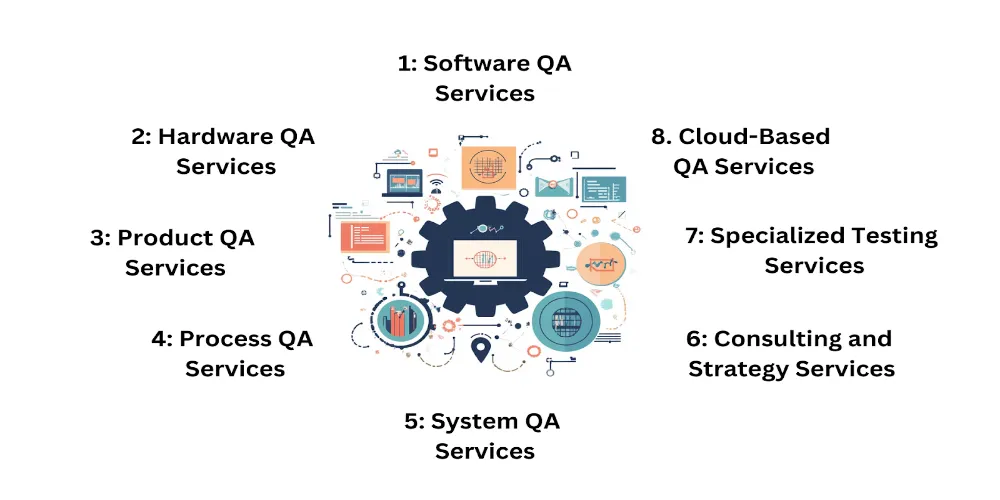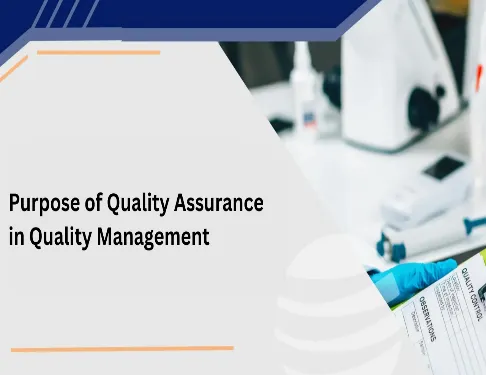What is the purpose of quality assurance in quality management
At the heart of societal growth and business success lies the fundamental element of trust. In the absence of trust, systems, relationships, and commercial endeavors...
By AMREP | Posted on September 25, 2024

In today's competitive markets quality assurance (QA) management is essential for businesses aiming to meet and exceed the strict standards of product quality and customer satisfaction. Whether refining software development, enhancing product reliability, or ensuring compliance across manufacturing processes, hiring the right QA management company can make all the difference.
This guide will walk you through the process of identifying, evaluating, and choosing the most suitable QA management partner to help you achieve your quality goals effectively.
Quality Assurance (QA) Management is the systematic process used to check whether a product or service being developed meets specified requirements. It is a way of preventing mistakes and defects in manufactured products and avoiding problems when delivering solutions or services to customers.
QA Management involves coordinated activities to direct and control an organization with regard to quality. Direction and control entail implementing quality planning, improvement, and assurance practices to ensure that a product or service is fit for its purpose.
Practical examples include software testing plans, product defect checks, user acceptance tests for software applications, and standardized product inspections in manufacturing.
The core fundamentals include quality planning, control, assurance, and improvement. These elements ensure that quality standards are met consistently.
Over the years, QA methodologies have evolved from simple inspection routines to complex, integrated processes involving automated testing, continuous integration, and development practices.
The history of QA can be traced back to the Industrial Revolution, but significant development occurred with the establishment of the International Organization for Standardization (ISO), which helped standardize QA practices across industries globally.
Current statistics reveal the impact of effective QA management, such as improved customer satisfaction, reduced costs associated with defects, and enhanced operational efficiency.
Quality Assurance (QA) Management includes various services aimed at ensuring that products, services, and systems meet consistent quality standards. These services are essential across different industries, from software development to manufacturing. Here’s a simplified overview of the different types of QA management services available:

Functional Testing: Checks that software functions as expected.
Regression Testing: Ensures updates don't break anything.
Performance Testing: Tests how the software performs under stress.
Security Testing: Finds security vulnerabilities.
Reliability Testing: Ensures hardware works reliably over time.
Compatibility Testing: Makes sure hardware works well with other systems or software.
Usability Testing: Tests if hardware is easy to use.
Quality Inspection: Checks products before they are sold.
Supplier Audits: Makes sure suppliers meet quality standards.
Certification Services: Helps products get official quality certifications.
Process Improvement: Makes production processes better and more efficient.
Compliance Audits: Checks that processes meet legal and safety standards.
Lean Manufacturing: Reduces waste in manufacturing.
Integration Testing: Tests how different parts of a system work together.
System Testing: Checks that the whole system works as intended.
Change Management: Manages changes to keep systems stable.
QA Strategy Development: Helps develop strategies to improve QA.
Quality Culture Workshops: Teaches teams about the importance of quality.
Accessibility Testing: Makes sure products are usable by people with disabilities.
Automated Testing: Uses software to perform tests automatically.
Cloud Testing: Uses cloud technology to simulate real user environments. Each service is crucial for maintaining high quality in products, services, or systems, which in turn helps protect brand reputation and increase customer satisfaction.
Define Your Needs
Start by clearly identifying what you need from a QA management company. Understand the specific areas where you require assistance—be it software testing, product compliance, or process improvement. This clarity will help you approach the right companies and communicate your requirements effectively.
Research and Shortlist
Begin your search by looking online for QA management companies with solid reputations. Websites with client reviews and rankings can give you a good starting point. You can also ask for referrals from business contacts who have engaged QA services before. Compile a shortlist of companies that specialize in the areas you need.
Evaluate Expertise
Look into each company's background and expertise. It’s important to choose a company with experience in your industry and the specific services you require. Review their case studies or request references to assess their capability and effectiveness in handling projects similar to yours.
Tools and Technologies
Ensure that the QA company uses up-to-date tools and technologies that are compatible with your systems. Their ability to adapt tools to fit your needs is crucial for seamless integration and effective QA management.
Check Reputation
Investigate the reputation of the company. Read client testimonials and check their certifications to ensure they adhere to industry standards. A company’s reputation for quality and reliability is often reflected in their client feedback and the professional accreditations they hold.
Discuss and Decide
Finally, have detailed discussions with the companies you've shortlisted. This step is vital to understand their approach, evaluate their readiness to meet your needs, and ascertain their willingness to adapt to your business environment. Choose the company that best aligns with your goals, budget, and company culture. Selecting the right QA management company is critical for enhancing your product quality and operational efficiency. Take the time to thoroughly vet potential partners to ensure they can meet your specific requirements.
As industries evolve with technological advancements, Quality Assurance (QA) Management is also undergoing significant transformations. The future of QA management is shaping up to be driven by innovations that not only enhance the efficiency and effectiveness of testing processes but also align closely with broader business goals. Here are some key trends likely to dominate the landscape of QA management:

Artificial Intelligence (AI) and machine learning are set to redefine QA processes by automating complex tasks that traditionally require human intervention. AI can predict potential areas of concern by analyzing data from previous testing cycles, thereby reducing time and costs associated with manual testing. Machine learning algorithms can adapt and learn from test results, improving test accuracy and efficiency over time.
The focus is shifting from quality assurance to quality engineering, where quality is not just tested but engineered from the ground up. This approach integrates quality control measures throughout the development process, from design to deployment, ensuring that quality is a priority at every stage.
With cyber threats becoming more sophisticated, there is a growing emphasis on incorporating security testing as a core component of QA. Security testing will not just be about finding vulnerabilities but also about ensuring compliance with international standards and regulations to protect data and privacy.
As more organizations adopt agile methodologies, test automation will become increasingly crucial. Automated testing tools that can quickly adapt to changes and provide rapid feedback will be essential. This agility will help organizations accelerate their development cycles while maintaining high-quality standards.
With the explosion of big data, QA will need to handle increasingly large datasets. Testing tools that can efficiently process and validate vast amounts of data in real-time will become essential. This will ensure that insights derived from big data are reliable and accurate.
The Internet of Things (IoT) continues to expand, and QA management will need to develop strategies to handle the complex ecosystems of interconnected devices. Testing will need to account for various factors such as device interoperability, performance under different conditions, and user experience.
Instead of just testing for performance bottlenecks, QA will evolve into performance engineering—proactively designing systems to meet performance criteria from the outset. This includes optimizing system performance and scalability to handle expected loads effectively.
DevOps practices integrate development and operations teams to improve collaboration and product quality. Continuous testing, as part of DevOps, ensures that feedback is immediate and continuous, leading to faster resolutions of issues and more rapid releases.
Virtualization allows QA teams to create simulated environments more quickly and with fewer resources than physical environments. Cloud-based testing platforms offer scalability and flexibility, allowing teams to manage testing resources more efficiently.
Leveraging predictive analytics in testing can forecast potential quality issues before they become critical. This proactive approach can significantly reduce downtime and enhance product quality.
These trends indicate a future where QA is more integrated, proactive, and aligned with technological advancements and business objectives, leading to smarter, faster, and more effective quality assurance practices.
By understanding your specific needs and evaluating potential partners thoroughly, you can make informed decisions that enhance both efficiency and product quality. With AMREP Inspect, you gain access to expert QA management services that align with your operational goals and ensure consistent excellence across all processes. Trust AMREP Inspect to be your partner in quality assurance, driving success and reliability for your business.
Read More :
Contact Us To See What We Can Do
Call Us
Mon - Sat 9.00 - 18.00
Sunday Closed


24 - September 2024
24
September
2024
At the heart of societal growth and business success lies the fundamental element of trust. In the absence of trust, systems, relationships, and commercial endeavors...

23 - September 2024
23
September
2024
Quality Assurance (QA) is critical in the software development lifecycle, focusing not just on identifying bugs but on preventing them from occurring. By adhering to predefined...

16 - September 2024
16
September
2024
Mexico has always encouraged investors and foreign companies to manufacture in Mexico. This has been largely through tax incentives, grants, economic policies, duty...
